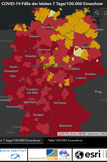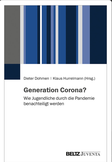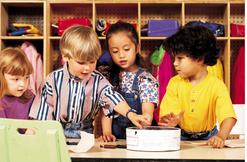Parents between all chairs
Unclear specifications require responsible design
Since November 2, restrictions have been in force again, which present parents with considerable difficulties. These requirements were actually supposed to be tightened up again last Monday (16.11.2020). Instead of clear guidelines, however, only recommendations were made - and these do not make it any easier for parents: What is allowed? How do you ensure domestic peace? And what can be done to remain mentally healthy? What if the little one wants to go outside to the playground and the big one gets frustrated because he is not allowed to see his friends at home? After all, he also sees them at school, where they have classes together and often talk outside without masks in front of their mouths and noses.

Seemingly clear rules?
On the surface, the rules seem relatively clear:
- Contacts with other people outside the persons living in the own household should be reduced to an absolutely necessary minimum. There should only be contact with one other household or one other person.
- Outside apartments, in principle, up to 10 people may meet if they come from no more than two households. (Violations of this rule can be punished with a fine!) This rule has not been fundamentally changed. However, it is also valid here that the persons should come from a fixed other household. Furthermore, the rules of distance must be observed; depending on the situation, a mask must also be worn.
- If several people are in closed rooms, it is recommended to ventilate regularly.
- Non-essential travel should be avoided, as should unnecessary stays in public places or means of transport, such as buses and trains.
- Tourist overnight stays are prohibited.
- The schools and daycare centres will remain open in principle. There are also no further requirements regarding alternating classes or compulsory masks. The respective National regulations continue to apply
- Leisure sports alone or in pairs in the fresh air are permitted.
These regulations result from the nationwide agreements between the Federal Chancellor and the Prime Ministers of the Länder.
However, the actual implementation is often the responsibility of the Länder, which can issue their own regulations and sometimes handle this differently. In Berlin, for example, one person has so far been allowed to meet with up to two other people from different households. Sports activities of children in larger groups are also permitted under certain conditions.
The current rules for your state are updated weekly here.
Scope for interpretation and negotiations
If one takes a closer look at the regulations, there are some questions regarding the concrete implementation. There are also contradictions between the regulations:
Thus, children continue to go to daycare or school, where they inevitably come into contact with several other children. In the afternoons or weekends, however, they should only meet with one other child - and always with the same boyfriend or girlfriend. This contradiction can hardly be communicated to children, neither smaller children nor, in particular, larger children. Since it is not a fixed guideline at present, but rather a recommendation, parents should handle it responsibly without losing sight of the overall goal. For example, a limitation to a smaller group of close friends would be an option with whom one meets more regularly. If possible, you should also make sure that children who have only a few friends are there. Whenever possible, the children should be outdoors or in smaller groups in the apartment.
You should negotiate with your family how you want to implement the regulations in a concrete way that reduces the risk and at the same time maintains family peace and the well-being of all as much as possible. Take concerns seriously, everyone should feel comfortable with the arrangements. As an adult, you should also set an example for the children and, for example, observe the distance regulations, wear mouth and nose protectors and, of course, reduce your contacts - and perhaps even reduce them more in order to give your child a little more freedom.
How to deal with the psychological distress of children?
An example from our everyday life: The big one wants to meet his friends, be it for learning or chilling. Our balcony has become a meeting place, almost every day some friends of our son are there, they chat and chill or play cards on the balcony. A few days ago we had our first real argument - it really got going: the question was whether the third friend may come or not (in Berlin, for example, three people from three households are allowed to stay outside together!) So there would have been four of them. After we first tried to stick to the rules, we finally found a compromise. We agreed that they would only be allowed to stay outside on the balcony. The decisive factor for us was that we saw the psychological pressure that the hard enforcement of the regulations would have caused. While we understand the basic objective, it cannot be at the expense of lasting psychological damage to children. No matter what the regulation is about - as parents you have a special responsibility towards yourself and your children.
Parental visit to the child living with the other parent
Another example from the advisory practice of the parents' hotline: Is the parent who is living separately allowed to visit his or her children who live in another, somewhat more distant place, or are the children allowed to visit and even stay overnight? Is this a necessary trip, or does it fall under tourism?
Here, most countries have decided in favour of the visit permit, i.e. parental visits to children who live with the separated parent are still possible. But even if there is no explicit regulation, parents should not be discouraged. From a formal point of view, on the one hand, the number of persons mentioned has not been exceeded, and on the other hand, it is hardly ever an unnecessary trip. The well-being of the child and the parents should take precedence here in case of doubt, rather than too narrow an interpretation. In addition, as a mother or father, you not only have the legal regulations in mind, but also the health and psychological well-being of your family
Children's birthday party
Even more than the individual regulations, however, the coexistence of different regulations leads to irritations. For example, private parties should be avoided as far as possible, even though smaller children meet in the nursery - without mouth and nose protection. And the kindergarten group is often larger than 10 children, even if the groups are quite strictly separated. So how do I explain to my three- or four-year-old child that his or her birthday is not possible even if the children from the daycare centre are invited?
A suggested solution could therefore be to celebrate the child's birthday in the nursery (if the nursery plays along) or to really only invite children who go to the same nursery. In this case, however, care should be taken to ensure that the parents limit their contacts as far as possible and do not use this opportunity for a cheerful exchange with each other or even for a meeting in a large group. For this reason, the children should - as at the day care centre - complete the last few metres alone and the distances should also be kept as far as possible when picking them up.
Children's playground
What about the playground? Here several children come together quickly? On the one hand, the Information page of the Federal Government refers to the fact that the distance regulations are observed. On the other hand, the individual Federal States determine whether playing in the playground is allowed or not.
Parents should take advantage of the freedoms they have and take their children out into the fresh air to encourage them to engage in physical activities. In addition to exercise and "motor training" in general, this also helps children stay healthier and get rid of their excess energy. In this respect, we strongly recommend taking the child to the playground or maintaining other forms of exercise.
Let us learn from each other
How do you hold it? What ways have you found to find a balance for you and your family between risk reduction and a pragmatic approach to the situation? Compromises have to be found here - which sometimes cannot always be based on the guidelines if you want to prevent permanent damage to family life or even the psyche. Command and obedience do not work in modern families, and it also contradicts the common understanding of education.
Did you like our article? In our parents' hotline magazine you will find a large number of articles on current topics, e.g (Parent Hotline Magazine). the Infection situation in children, whether schools should close or not and the fact that Parents need more support from politicians (To close schools or not). There are also practical tips on how you and your family can get through the autumn and the Corona crisis.
Published on
Topics
Articles on the topic
-
How do I find a school place for my child?
Depending on the state and type of school, different things need to be...

-
Childcare - how does it work in Germany?
The path from application to daycare place is simple and complicated at...

-
Controversy: open schools or close schools?
Politicians should react now to slide unprepared into a forced closure....

-
Corona pandemic severely disadvantages children and young people - but there is no "Corona generation"
This is a core finding of the anthology "Generation Corona? How young...

-
What to do after the Easter holidays? - Part 2: Final exams
An overview of the regulatory diversity

-
Kitas and schools in a state of flux
Update from 9.4.2021 on the current regulations
